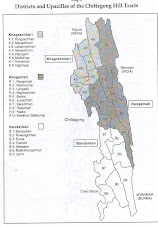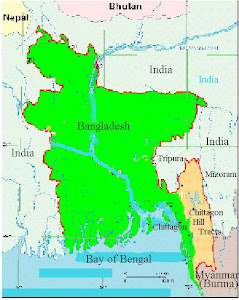chtnews.com
News No.23/2009, April 10, 2009
The Hill Student’s Council has held a rally today in Panchari in Khagrachari district in commemoration of those killed in Logang Massacre in 1992.
At least at two points –Pujgang and Panchari army zone -- the army prevented hundreds of participants from coming to the meeting venue at College ground, one kilometer south of Panchari bazaar.
Despite that, the turn out has been satisfactory, PCP sources said, putting the figure at 1,200.
Presided over by PCP president Ricoh Chakma and conducted by its General Secretary Aungyo Marma, the meeting was addressed by Konica Dewan, Organising Secretary of Hill Women’s Federation and Sukiron Chakma, a member of the PCP, while Ratan Chakma read out the commemoration message.
Before the meeting, a team of the PCP and HWF met the TNO at his office and lodged a strong protest at the way the army was preventing the people from participating in the program.
However, the TNO brushed aside the complaint and instead ordered them not to use mike in the meeting. He also asked them not to bring out any procession, and to confine themselves to the rally.
In a bid to foil the commemoration meeting, the local military and civil administration in Panchari had imposed section 144 last night. However, they had to withdraw it subsequently after UPDF and its front organisations made a strong protest to the Khagrachari Deputy Commissioner.
Longang Massacre Day is a day which will never be forgotten by the Jumma people. It is often viewed as the My Lai of Chittagong Hill Tracts. On this day in 1992, a group of settlers in league with the paramilitary Bangladesh Rifles and Village Defense Party (VDP) personnel carried out an attack on unarmed Jumma civilians in Logang cluster village, killing at least 200 persons, including women and children, and burning down thousands of houses.
The incident evoked national and international condemnation, and acted as a catalyst to the formation of the National Committee for the Protection of Human Rights in the Chittagong Hill Tracts, which played a crucial role in drawing media attention to the just cause of the Jumma people.
To eyewash the international community, the then Khaleda government formed a one-member inquiry committee headed by Justice Sultan Hossain Khan. In his inquiry report, which was made public -- an unusual phenomenon in Bangladesh where such inquiry reports usually never see the light of the day -- Mr. Khan absolved the perpetrators and laid down the army version of the incident verbatim.
Not only that, he went to the extent of making a recommendation that the government should arm the murderer settlers for “self-defense”. On the other hand, Mr. Khan maintained a complete silence about the need for safety and security of the Jumma villagers, who were the victims of the massacre.
The Jumma people, including the PCP, rejected the inquiry report of Sultan Hossain Khan and demanded exemplary punishment to the perpetrators.
skip to main |
skip to sidebar


Map of Bangladesh

CHTs is number one Milliary zone in the world


Ministry of Chittagong Hill Tracts Affairs
The United Nation
The IJPMNA
This page provides information of the minority Indigenous Jumma Peoples in Chittagong Hill Tracts (CHTs) Bangladesh.
Contact with this please write:-ijpnusa@yahoo.com
Contact with this please write:-ijpnusa@yahoo.com
About Us
Location of Jummaland

Jumma Videos
- The BANDARBAN SADAR
- The Rowangchari
- The Ruma
- The Lama
- The Thanchi
- The Alikadom
- The Naikhkhongchari
- The RANGAMATI SADAR
- The Baghaichari
- The Langudu
- The Nanyachar
- The Barkal
- The Jurachari
- The Bilaichari
- The Kaptai
- The Rajsthali
- The Kawkhali
- The KHAGRACHARI SADAR
- The Manikchari
- The Laksmichari
- The Mahalchari
- The Matiranga
- The Ramgarh
- The Dighinala
- The Panchari
Audio & Video
Jumma Natok (Drama)
International Support
Educational Institution
Religious Organization
Buddhist Studies

Map of Bangladesh
Mission of Bangladesh
About Bangladesh
Bangali Audio Songs
Bengali News

CHTs is number one Milliary zone in the world
Online Audios
Refugee in Homeland

Jumma Picture

Blog Archive
About Me
- The Indigenous Jumma Peoples Movement in North America
- The Chittagong Hill Tracts (CHT) region comprises three districts: Banderban , Khagrachari and Rangamati. The districts comprise seven main valleys formed by the Feni, Karnafuli, Chengi, Myani, Kassalong, Sangu and Matamuhuri rivers aid their tributaries and numerous hills, ravines and cliffs covered with dense vegetation, which are in complete contrast to most other districts of Bangladesh, which consist mainly of alluvial lands. Geographically the CHT can be divided into two broad ecological zones: (a) hill valley, (b) agricultural plains. It is surrounded by the Indian states of Tripura on the north and Mizoram on the east, Myanmar on the south and east and Chittagong district on the west.
